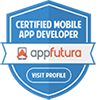Today mobile phones are considered as the most useful medium to seek information. They are heavily used devices for many such purposes. In fact, today every mobile device has at least a total of ten mobile applications for several purposes, be it taxi-booking app, food delivery app, e-commerce app, social networking apps, banking apps for easy transactions, music apps, and the list is absolutely endless. These apps are useful to make people’s lives easier by being immensely informative, fast, easily understood, and most important of all, user-friendly. In case, a mobile app fails to meet these above requirements then users consider it as useless and time-wasting.
Hence, there is a huge responsibility on the part of mobile app developers to come up with an app idea that is absolutely in sync with current market trends and the trends in the programming arena. It is imperative to get the right information and databases for your app in order to ensure that it gets desired views and clicks.
This is the reason that when developing a mobile app, it is vital that you are making a wise move while choosing its database. There are tremendous choices available in the market as it comes to selecting a database for mobile app development when there are several factors that need to be considered before jumping upon one.
In this article, we will cover in-depth the many aspects of the database, its types, and what factors need to be kept in mind while choosing one.
What is Database?
To keep things simple, let’s understand it this way. So, you are enticed by a mobile app that you recently find out. Now, what would you do next? You would certainly want to install the app and register into it, right? Once you have registered yourself to the app, you can now use the app whenever you want in the future, by simply having to log in using your username and password. Because the app is going to automatically recall the data provided by you while the registration process.
Now did you ever give this a thought that how a mobile app identifies you and even remembers all data just instantly? Well, it is all thanks to the database. It is the database that stores all the user information while s/he registers for a mobile app.

Why a mobile app requires a database?
Well, without a database, it would be impossible for a mobile application to store tonnes of data for millions of customers. A database doesn’t just only help to store data, but it also makes it easy to update any of the particular data (from large volumes of data that is already there is a database) with newer data. Also, the data that is stored in an app’s database is way more secure than being stored in any of the other forms and it helps in identifying any duplicate data set already present in it. This certainly would be difficult to do if the data is stored in any other data storage mode. Often it also happens that the users enter incomplete data sets, which can be problematic for any mobile app. However, a database can easily identify such cases.
Meanwhile, a user can’t interact directly with any database – there must be an interface or an intermediate system that enables users to interact with it. This kind of interface is known as the DBMS (database management system). This basically is a computer software application that interacts with user or the other apps, and even with a database, so to capture and analyze data. Any of DBMS, for instance, MYSQL, is designed in a manner that it enables to define, query, create, update and administer the whole database. Here, the database is requested to provide the required data in a query language.

How many types of Database are there?
Mainly, the databases are of five types, such as:
- Relational Database: This is the most commonly used database among the rest and it does the job of storing different data in the form of a data table.
- Operational Database: This prominently used database is popular among various organizations mainly inventory database, personal database, and customer database.
- Data Warehouse: Several organizations are there that require keeping all of their crucial data for a long period. For such organizations, the data warehouse proves to be significantly useful.
- Distributed Database: Just as the name says, distributed databases are for the organizations with different office locations, and they require a different database for each of the locations.
- End-user Database: This database proves to be useful for meeting the requirements of end-users in an organization.
Now, that you have understood about the database types, next let’s find out the ways to choose the right database for a mobile app.
How to choose the Right Database for your mobile app?
Well, choosing the right database for a mobile app can really be a tricky affair, mainly when someone doesn’t know about the right strategies to make the ultimate choice. While choosing a database, it is vital to be aware of these strategies in order to be in a profitable situation. Thus, you need to be right the first time itself.
The benefits that you would have by making the right choice first time itself, are:
- Only when the right database is chosen, the important information will get stored in a database, and this would put the data in a consistent manner.
- You can ensure the overall good performance of your app by choosing the right database and it will also help in easy maintenance.
- It is necessary to normalize the database design as that would help in reducing data redundancy and prevent data duplication. Ultimately, this would lead to reducing the database size.
- When the correct database is chosen, the queries that are prompted to fetch the data are going to be simple and executed way faster.

Now that you know about the many benefits of choosing the right database, next let’s explore the factors that should be considered while selecting a database for a mobile app.
- Supported Platforms: While creating a mobile app, the first thing that is considered is the client’s platform that the app will support. Right now, a large group of people is using iOS and Android, but there are still many who don’t. Also, find out whether the clients would prefer going for more than these systems, such as IoT devices, embedded systems, smartwatches, and other wearables. Accordingly, consider whether your databases can support laptops and desktops, as many apps today start as a mobile application prior to being extended to laptops. So, accordingly, evaluate databases and the cloud options as per the platform for which you are building the app.
- Flexible Data Model: It is advised to use Data Modelling Flexibility for instances when you require to efficiently and appropriately articulate model requirements for the apps. Your database creation hugely depends on it. Ultimately, your app’s future will depend on how flexible is the data model. Due to the fact that mobile applications evolve at really fast rates, so your model needs to be quite flexible so it copes with it and accommodates all the changes. For consistent & relational data, relational database works best. But in case of any change in data requirements, then systems offering greater data flexibility, such as NoSQL database, make the best choice.
- Resolve Data Conflicts: Data conflicts are easily possible on the platforms that are using decentralized data writes. Thus a strong system is required for resolving conflicts that may arise. The resolution chosen by you must allow for automatic database resolution in the cloud or on devices. Same is for the resolutions either by humans or the external systems.
- Synchronize systems: It is again important to synchronize systems as you choose a database for your mobile app. Keep in mind that synchronizing and resolving conflicts go hand-in-hand. To control how the systems synchronize involves replications. Now, these replications basically are strategy, conditional & filtering. The replication strategy needs streaming support, push support, continuous support, pooling support, and one-time support. Being able to use all of these strategies together will be an added advantage.
In the case of conditional data replication, it only takes place in certain conditions, like when the power supply of your device is sufficient or when a device is on Wi-Fi. Meanwhile, for Filtering replication, it just allows for some data to replicate whereas it leaves the others out

- A choice between building sync and buying: You can get sync for your apps in two ways like you either buy it from a service provider or you can choose to create your own sync solution. The second option here seems to be more challenging and very complex owing to distributed computing that comes along with sync. What works best is that you leave the data synchronization to expert stack and choose to focus on other app features. In case you are still keen on building sync, keep in mind that it is going to consume a lot of your resources and time. Meanwhile, above all, go for a solution that brings in more flexibility. The solution should be secure, flexible, and manageable and must work well with or without any internet connectivity.
Final Thoughts:
A lot of factors need to be considered while choosing the best database for your mobile app. After all, if you end up going for anything less than that best available out there in the market, then your app may bear the brunt. So make a wise choice with your database, to end up with a successful and highly ranked application.

















